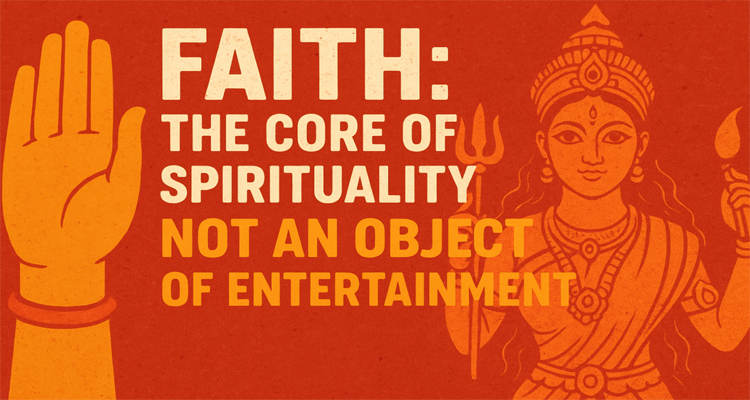 Faith is not merely a word—it is the unbroken, fundamental seed upon which the entire edifice of our Sanatana culture, spirituality, reverence, and devotion rests. It is the very essence of our timeless legacy. Think about it: the vast river of knowledge—the Vedas, Puranas, Upanishads, the Gita, and the Ramayana—all owe their existence to the profound faith and devotion of our ancient sages. To this day, these texts remain the foundational pillars of our collective belief.
Faith is not merely a word—it is the unbroken, fundamental seed upon which the entire edifice of our Sanatana culture, spirituality, reverence, and devotion rests. It is the very essence of our timeless legacy. Think about it: the vast river of knowledge—the Vedas, Puranas, Upanishads, the Gita, and the Ramayana—all owe their existence to the profound faith and devotion of our ancient sages. To this day, these texts remain the foundational pillars of our collective belief.
It is an undeniable truth that if any culture in the world is rich, resilient, and vibrantly alive today, if there exists a power capable of guiding humanity towards peace and self-realization, it is India. And the sole source of this strength is our unshakeable faith. Our spiritual awakening and discipline are miraculous fruits of this deep, divine belief. It was faith that once made India the Vishwaguru (World Teacher). As we return to our roots today, we see ourselves advancing once again on that same ancient path—the path of Faith.
Yet, at a time when faith should be shining brightest, a despicable game is being played to tarnish its very essence. We are in the midst of Navratri, the most sacred time for worshipping Maa Durga, the Universal Mother. On one side, every temple and home resonates with Vedic chants, conch shells, bells, and hymns of Jagadamba. On the other side, however, some people—desperate for cheap popularity, eager to project dominance, or to flaunt hollow wealth—are engaged in defiling our unwavering faith.
It is shameful and deeply regrettable that in the name of Aastha (faith), vulgar displays of obscenity have recently been staged in Bokaro, Jharkhand. During Durga Puja, we worship our daughters as embodiments of the Goddess, we revere our mothers and sisters. Yet, simultaneously, a vile trend is growing—where women are portrayed as objects of lust, under the guise of “art.” This double standard is nothing short of a direct assault on our social consciousness.
Garba and Dandiya, devotional dances originating in Gujarat, are internationally celebrated as pure expressions of surrender to Maa Durga. But a recent event organized under this banner was nothing but a sinister attempt to bury our faith under disgrace. The irony is bitter: thousands attended, enjoying the spectacle as mere “entertainment,” indifferent to the defilement of their own faith. What spiritual stupor is this?

Inviting an actress known for vulgarity in Bhojpuri cinema, having her dance suggestively in indecent attire to cheap songs with no place in civilised society—this is utterly disgraceful. It is a living proof of the steep decline of our collective morality.
The greatest crisis we face today is the rush to turn faith into entertainment. True devotion originates from the heart—where worship is performed with profound belief. But in the age of social media, the race to make reels, collect likes, and chase comments has reduced bhakti to mere song and dance, hollowing its very essence.
What is more shocking is that people often skip the aarti at temples but are ready to spend money to attend such spectacles. What kind of devotion is this? It reflects a disturbing shift in our society’s priorities. We see this “DJ-ification” of faith every year during Saraswati Puja as well—when instead of hymns, students blast vulgar songs, carrying the “coffin” of learning, and cross all boundaries during immersion. This is nothing less than dismantling the values of our own religion.
This is truly shameful—for our culture, for Sanatana Dharma, and for the tradition that has the potential to once again make India the Vishwaguru. While the greatness of Sanatana Dharma is universally acknowledged, such vulgar spectacles deal a grievous, self-inflicted blow to our faith.
The first necessary step is strict government and administrative enforcement. There must be clear provisions for penalties, so that organisers receive the message: obscenity in the name of faith will no longer be tolerated.
But beyond laws, social awareness is even more crucial. This is not just the government’s fight—it is the fight for our soul. When society collectively boycotts programmes that peddle vulgarity in the guise of faith, when people refuse to attend, organisers—motivated only by money and false prestige—will lose the courage to defile our traditions.
At the same time, so-called “artists” who tarnish the dignity of art must also learn a lesson. They must understand that true art is far greater than vulgarity. Faith is not meant to be turned into spectacle; it is meant to be worshipped.
We must remain vigilant. Faith is not a commodity to be sold—it is the sacred flame that must be preserved.
(Written by Deepak Jha, Journalist, Bokaro, Jharkhand; views are personal )





